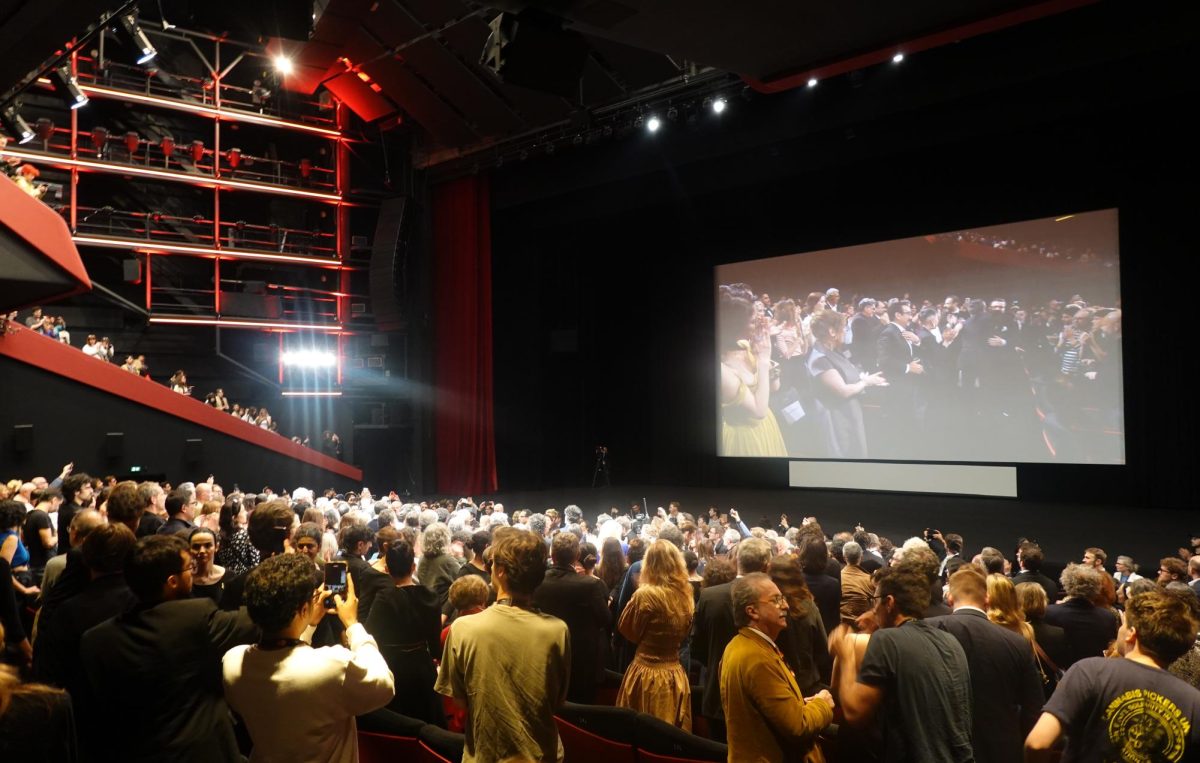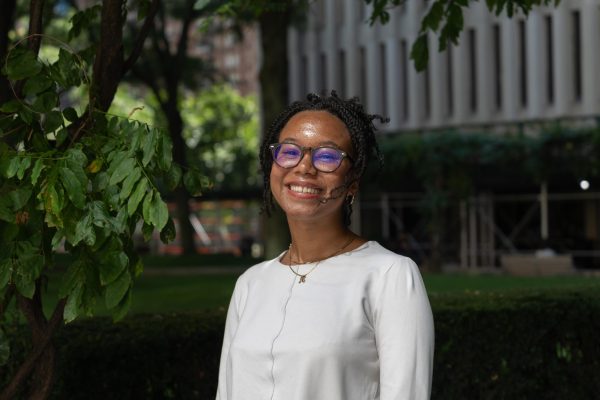The 78th annual Cannes Film Festival has concluded its run from May 13 to May 24. This year’s festival was filled with surprises, standing ovations, plenty of debuts and Gen Z’s favorite stars.
Before being widely known as the most prestigious international film festival in the world, Cannes began in 1939 as a way to compete with the Venice Film Festival and its fascist-leaning tendencies. Since then, the iconic steps and red carpet have been walked by many, and the festival has presented the most well-known films in modern history — from Martin Scorsese’s “Taxi Driver” to “Shrek.”
Cannes falls in the middle of the Sundance, Berlin, Venice and Toronto film festival circuit and serves as a launch pad for global art.
The jury for this year’s feature film category was composed of Halle Berry, Payal Kapadia, Alba Rohrwacher, Leïla Slimani, Dieudo Hamadi, Hong Sangsoo, Carlos Reygadas, Jeremy Strong and Juliette Binoche, who served as the jury president. The jury is selected through nominations submitted by representatives of the festival, who also look at the individuals’ body of work and experience. The jury is then responsible for awarding the films shown in the competition.
No distributor in the history of Cannes has had consecutive wins, let alone six back-to-back Palme d’Or wins.
The opening ceremony for the festival paid tribute to Fatima Hassouna, a Palestinian photojournalist who was killed along with her relatives by an air strike on her family home in Gaza. This came after the documentary “Put Your Soul on Your Hand and Walk” was announced to run at the festival, featuring a series of conversations between Hassouna and the documentary’s director, Sepideh Farsi.
Binoche, the jury president of Cannes, said in a speech, “She should have been here tonight with us … In every region of the world, artists are fighting every day and make resistance into art.”
Robert De Niro received an honorary Palme d’Or for his lifetime achievements at the opening ceremony. The award was presented by Leonardo DiCaprio. In his acceptance speech, De Niro highlighted the threats facing the arts.
“This is not just an American problem, it’s a global one,” De Niro said. “We can’t all just sit back and watch. We have to act and we have to act now — not with violence, but with great passion and determination. It’s time for everyone who cares about liberty to organize; to protest — and when there are elections, of course, to vote.”
The prestigious Palme d’Or is awarded to the best film at the festival. It’s the most highly anticipated award at Cannes because it is known to be a great indicator of the success of the film in the impending award season. Last year’s Palme d’Or winner, “Anora,” went on to win best picture, actress, directing, editing and original screenplay honors at the 97th Academy Awards.
But the other buzzworthy conversation around the Palme d’Or this year was whether NEON, a film distributor, would go six for six on Palme d’Or wins. NEON has distributed the past five recipients of the award: “Parasite” (2019), “Titane” (2021), “Triangle of Sadness” (2022), “Anatomy of a Fall” (2023) and “Anora” (2024).
NEON succeeded. No distributor in the history of Cannes has had consecutive wins, let alone six back-to-back Palme d’Or wins.
“It Was Just an Accident,” directed and written by Jafar Panahi, won this year’s Palme d’Or. The film is described as a minor accident that spirals into a series of escalating consequences. It was inspired by Panahi’s prison experience and the hunger strike that prompted his release.
Critic Christina Newland wrote, “with a desire to amalgamate and bring some of those experiences to life, Panahi creates vivid Iranian characters whose actions express the reverberations of trauma and repression.”
“Sentimental Value” received a 19-minute standing ovation at its premiere.
The Grand Prix, which is the second highest award at the festival, was given to writer and director Joachim Trier’s “Sentimental Value.” The film follows sisters Nora and Agnes as they reunite with their estranged father, Gustav Brog, a director who is making his comeback film while attempting to repair his and Nora’s relationship. When Nora turns down the role he has written for her, he gives it to a young American star.
“Sentimental Value” received a 19-minute standing ovation at its premiere.
Chief Film Critic at the Hollywood Reporter David Rooney said that “the movie’s poignancy accumulates gradually, every supple turn expertly modulated as the presence of generations past becomes more tangible.”
This year’s Jury Prize, the third award given out, ended in a tie. The prize went to both director Mascha Schilinski’s “Sound of Falling” and to writer and director Oliver Laxe’s “Sirât.”
“Schilinski has constructed a haunted-house story of unique and devastating proportions, essaying a litany of historical cruelties visited on women throughout the 20th century, up to a present day in which much has changed but the song remains the same.” Guy Lodge, Critic
“Sound of Falling” is a German film that follows four girls — Alma, Erika, Angelika and Lenka — who spent their youth at the same farmhouse. Despite never being there at the same time, the girls’ lives mirror each other, and viewers get to see how the home evolves over time.
As for the story, critic for Variety Guy Lodge described it as haunting: “Schilinski has constructed a haunted-house story of unique and devastating proportions, essaying a litany of historical cruelties visited on women throughout the 20th century, up to a present day in which much has changed but the song remains the same.”
“Sirât” is about a father and son who go to a rave in the mountains of southern Morocco to search for Mar, their daughter and sister, respectively, who went missing there months ago. The duo struggles to make any progress finding Mar, but follow a group of ravers as they go to one last party and confront their limits.
Reviewer Jacob Stolworthy said the film can best be described as a slow burn. Stolworthy wrote that the film’s “descent into hell caused some of the biggest gasps we have heard in a cinema.”
Kleber Mendonça Filho’s “The Secret Agent” won awards for best director and best actor. The film is set under a military dictatorship in 1970s Brazil. It follows Marcelo, who is returning to his hometown hoping to find peace. Marcelo is fleeing the chaos from his past, but it only continues to follow him at home. Wagner Moura won the best actor award for his portrayal of Marcelo.
At just 23 years old, newcomer Melliti beat actors like Jennifer Lawrence, Elle Fanning and June Squibb.
The best actress award went to French actress Nadia Melliti for her portrayal of 17-year-old Fatima in Hafsia Herzi’s film, “The Little Sister.” At just 23 years old, newcomer Melliti beat actors like Jennifer Lawrence, Elle Fanning and June Squibb.
Jon Frosch, a senior editor at Hollywood Reporter, described Melliti’s performance as “one of the most auspicious screen debuts I’ve seen in a while.”
The film follows the youngest of three daughters as she enters university in Paris and tries to forge her own path. It’s a coming-of-age story of a French Muslim girl’s sexual awakening that relies heavily on the principal performance. Melliti portrays the uncertainty, desire and discomfort that comes with finding oneself.
Best screenplay went to “Young Mothers” by Jean-Pierre and Luc Dardenne. The film is about five teen moms living in a shelter for young mothers as they hope for a better life.
The film that took home the Special Prize was Bi Gan’s “Resurrection.” The Special Prize is an award that isn’t given out every year. It is awarded to films that the jury believes should be recognized outside the usual parameters. “Resurrection” follows a woman who, after waking up from brain surgery, finds herself in a dreamworld that’s in ruins. There, she stumbles upon a broken, android-like creature which she must restore.
Not all of the films in competition took home awards, but some still garnered high praise. The actor Harris Dickinson’s feature directorial debut, “Urchin,” had the audience on their feet for its portrayal of the cycle of self destruction with its unhoused protagonist Mike in the streets of London. Dickinson most recently starred in “Babygirl” with Nicole Kidman and in “Triangle of Sadness,” which won the Palme d’Or in 2022.
Another actor who had their directorial debut at Cannes was Kristen Stewart, nominated for her work titled “The Chronology of Water.” Stewart adapted the memoir of Lidia Yuknavitch, once an Olympic swimming prospect who received a college swimming scholarship in Texas to escape her abusive household. She ultimately lost the scholarship due to struggles with addiction. At the University of Oregon, Lidia finds comfort in literature, which allows her to explore trauma and find her own voice.
The actor Harris Dickinson’s feature directorial debut, “Urchin,” had the audience on their feet for its portrayal of the cycle of self destruction with its unhoused protagonist Mike in the streets of London.
Josh O’Connor appeared in two film premieres at Cannes. The first is “The Mastermind,” where O’Connor plays an amateur art thief planning his first big heist. The second film is “The History of Sound,” a queer romance set during World War I that also stars Paul Mescal.
Jennifer Lawrence and Robert Pattinson play a married couple in Lynne Ramsay’s “Die, My Love,” which is an adaptation of Argentinian writer Ariana Harwicz’s novel of the same title. Set in rural America, Lawrence played a mother dealing with postpartum depression and the stress of domesticity and marriage, which slowly makes her unravel.
In a New York Times interview, Lawrence described how becoming a parent has changed her creatively, “I didn’t know that I could feel so much, and my job has a lot to do with emotion.”
Not only that, but Lawrence began filming the project when she was four months pregnant with her second child.
Another notable film to mention is the first Nigerian film to premiere at Cannes, “My Father’s Shadow” by Akinola Davies Jr. The film follows an estranged father and his two young sons during the 1993 election crisis in Nigeria as they try to get home.
These are just some of the films featured in the Cannes Film Festival this year. There is something for everybody, from historical and biographical work to stories that tackle issues of self-destruction, postpartum or coming-of-age. Hopefully, all of these films will be in the theaters in the upcoming months.


